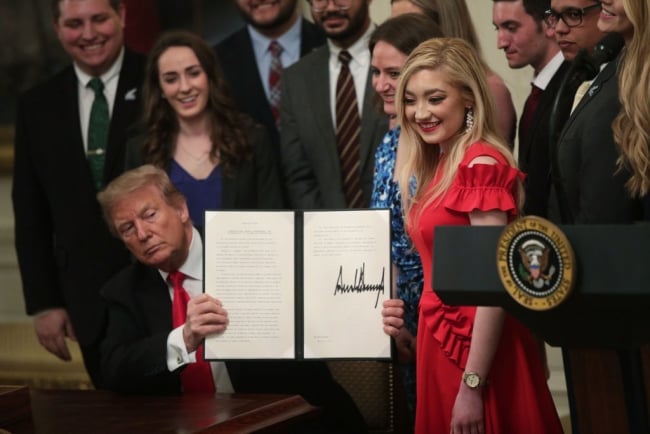You have /5 articles left.
Sign up for a free account or log in.

The "free speech hotline" is a follow-up measure to President Trump's March 2019 executive order to ensure First Amendment protections on college campuses.
Alex Wong/Staff via Getty Images
The United States Department of Education is implementing a first-of-its-kind “hotline” at the agency for students and faculty members to file complaints of censorship on campus, federal officials announced Tuesday.
But free speech advocates and higher education representatives are doubtful this move will have any impact on colleges as a new administration is poised to take over the agency, replace political appointees and other department heads, and possibly move the agency in another direction or dismantle the hotline. Also in question is whether department officials have the legal authority to enforce free expression policies on campuses.
The “free speech hotline” will be an email account managed by attorneys from the department’s Office of General Counsel, which will receive reports of First Amendment violations on college campuses nationwide, Robert King, the assistant secretary of education for postsecondary education, said during an event Tuesday called “What Is to Be Done? Confronting a Culture of Censorship on Campus.”
Over the last few months, the department has also initiated investigations into seven institutions “to determine if universities are permitting free and open expression as specifically guaranteed by those same universities,” King said during the event.
The creation of the hotline during the last six weeks of the Trump administration appears to be a last-ditch effort by officials to address the issue of speech suppression on college campuses -- particularly complaints of censorship by conservative students and professors -- which President Trump has rallied against while in office. And 2020 was a banner year for complaints of free speech and expression violations, according to a new report by the Foundation for Individual Rights in Education, or FIRE, a campus civil liberties advocacy group.
Terry Hartle, senior vice president of government relations for the American Council on Education, or ACE, said the suggestion that colleges are actively suppressing speech is a “misleading narrative” and the department does not have the legal authority to interfere in campus activities.
“These are a series of politically motivated investigations pursuing issues the department wants to pursue,” Hartle said. “This is another case where the Department of Education is telling people what they want to hear rather than what the facts actually are.”
The basis for the hotline is an executive order Trump signed in March 2019 to ensure colleges are abiding by the First Amendment and their own free expression policies, Hartle said. Both were criticized as unnecessary by some higher education leaders. Michelle Deutchman, executive director of the University of California’s National Center for Free Speech and Civic Engagement, said in an email that the new hotline is a “solution in search of a problem” and “potentially detrimental.”
“There are plenty of avenues for First Amendment issues to be resolved at the campus and state levels,” Deutchman said. “We don’t need the federal government intervening and further politicizing this issue at a time when there is already such intense polarization in higher education and in society at large.”
Joe Cohn, legislative and policy director for FIRE, said the hotline would be the first system in place within the department to specifically receive and review complaints of First Amendment violations. The Office for Civil Rights does consider existing legal standards for campus free speech when investigating discrimination reports made under Title VI and Title IX, the laws prohibiting discrimination on the basis of race, color, national origin and gender at federally funded institutions.
“They’re not entirely lacking in the ability to do this work,” Cohn said. “But it will be interesting to see what they dedicate to it and the kind of scope that they offer to it.”
There are some prevalent violations on campus that Cohn believes could be “low-hanging fruit” for the department to confront, such as policies establishing “free speech zones” that limit expressive activity to a given area on campus, violations of professors’ academic freedom or “overbroad antiharassment policies” that go beyond the U.S. Supreme Court’s definition for conduct that qualifies as harassment.
Cohn and FIRE view the hotline as a generally positive development. This new process could provide students, faculty and staff members a way to seek relief from speech suppression and an alternative to filing a lawsuit against their college or university, Cohn said.
“There’s some excitement around the Department of Education being willing to tell schools to stop doing the most egregious things that they’re doing with free speech,” he said. “It does give advocates a new tool for remedies shy of litigation. That’s kind of an intriguing thing. Not every student, even if they’ve been egregiously harmed, wants to sue their school.”
But Hartle said the department has “no legal authority” to sanction an institution for its policies on free speech and expression.
“The General Education Provisions Act, established when the department was created, explicitly bars the department from interfering in campus activities, period,” he said.
The Biden administration, which will assume control of the federal government Jan. 20, is also likely to be pressured to get rid of the hotline by those who view it as conservative partisanship or by college leaders who bristle at executive interference in campus discourse, Cohn said.
Nicole Neily, executive director of Speech First, which like FIRE is a national campus civil liberties advocacy group, said in an email that she assumes the new reporting system will “be unwound in six weeks once the Biden administration takes over.” Hartle said ACE has already requested that the new administration withdraw Trump’s executive order and, as a result, the hotline would also be dismantled.
“All these staffers are going to turn over, too,” Neily said. “It’s a weird time to roll this out and pretend like it’s business as usual.”




